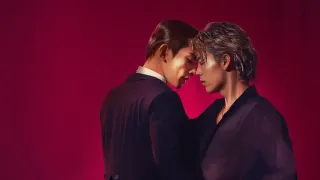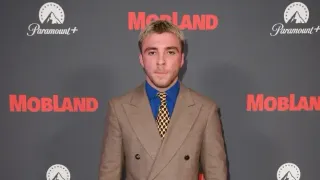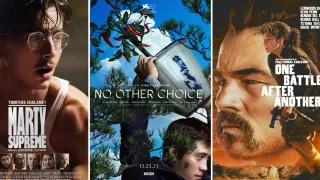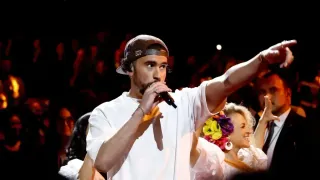June 13, 2023
EDGE Interview: New Rock Hudson Doc Goes Inside Actor's Closeted Life
Matthew Creith READ TIME: 15 MIN.
In its world premiere at the Tribeca Festival this month, "Rock Hudson: All That Heaven Allowed" details the actor's trajectory from part-time truck driver to one of the most popular performers in the golden age of Hollywood. Hudson was famous for his chiseled good looks. Women wanted to sleep with him, and men wanted to be him. But underneath all the fame and prosperity there was a man trapped in the closet, carrying on affairs with other men in his private life while womanizing famous actresses on the silver screen.
I got the chance to screen the new documentary before its Tribeca premiere and the film's debut on HBO on June 28th. I caught up with director Stephen Kijak to discuss Hudson's life, his many loves, his onscreen persona, and the actor's eventual impact on the AIDS crisis of the 1980s. Sadly, AIDS took the life of one of America's leading men, and it's all on display in Kijak's newest film.
EDGE: Stephen, I had a chance to screen "Rock Hudson: All That Heaven Allowed," and I appreciate you taking the time today to talk to me about it. What drew you to make a documentary about Rock Hudson?
Stephen Kijak: My producers that I've worked with for quite some time developed and brought it to me on a silver platter. So, I was drawn to working with my good friends again and get my collaborators back together. But also it was just like the right story at the right time. It's too good to be true. You know, we had done a deal with the estate collection. We had an absolutely mind-boggling amount of archive to work with including his home movie collection, which is always a treat. And yeah, just look around the world today. Gays under attack. anti-gay sentiment, left, right and center. So let's tell the story of a mid-century character who was a closeted gay man and ended up having a real impact on the trajectory of history when he was revealed to be gay and have HIV. I mean, his impact on the AIDS crisis was significant, despite the fact that he may not have consciously wanted to have an impact in that way. So, it's a big, complex, important story and I was really happy to tell it.
EDGE: It's always very interesting. I'm a gay man myself. I am married. I've been married for over three years now. The landscape in 2023, I think, is quite different than it was in the 80s. And even in the 50s and 60s when he was coming up as an actor. How do you think that he could live his life now in 2023? [This week] The Human Rights Campaign came out with an emergency declaration on the state of the LGBTQ+ community. Do you think it's getting better? Do you think it's getting worse? Do you think that Rock Hudson himself would be an out actor working in Hollywood today?
Stephen Kijak: Oh, Rock Hudson would not be an out actor working in Hollywood today. He was a closeted square from the 50s who was created, or who came of age in the studio system. Which was this restrictive, artificial bubble. So no, he was very much a man of his time. I think it'd be very incongruence in our current climate and cinematic climate. But you know, whether or not things are getting better, or worse, I mean, you know, they get better, they get worse. They're getting better and worse simultaneously. It's so screwed up right now.
In a way, the problems that gays had back in his day seems so much more simple and clearer than they do today. But then again, he was taken down by AIDS. That period, the early days of AIDS, I don't think younger people have a clear picture of really what it was like. They really don't. One of our producers was talking to someone about this and they were like, "Was it really that bad?" You know what I mean? If you weren't in it, and I wasn't even in it. I came of age, just sort of like on the other side of it, but it was close enough that I remember in the early 80s, mid to late 80s. It was an interesting time for someone like him to try to navigate a public and private life for sure.
EDGE: I was very impressed with the documentary in general, but also just kind of how you told that story. From beginning to end. You use a lot of his film clips, a lot of scenes that he was in and interactions that he had with costars, to tell his private story which is very impressive. I think that's very hard to do, especially in the editing room, to be able to use a lot of that to make it a little bit more current. Even though it was filmed in the 1950s, what was it like for you to do a lot of research on his films? I noticed that "All That Heaven Allows", one of his major films, was used throughout this documentary and spliced together with archival footage, interviews with former costars, and whatnot. What was that process like for you to do a lot of that research and find all these clips?
Stephen Kijak: Well, I got to watch over 65 Rock Hudson movies back-to-back.
EDGE: Lucky you!
Stephen Kijak: Yeah. Oh my goodness, that was interesting. Because I gotta say I always want to give props to Mark Rappaport, who's this great independent filmmaker, who over a good number of years did a really cool little kind of experimental essay movie called "Rock Hudson's Home Movies" that really just completely splices together every fantastic double entendre and little secret coded scene from all his movies, and then makes meaning sometimes when there really isn't meaning there.
But it's such a compelling case. It was really great to rewatch that and that along with Mark Griffin's great recent biography, and all the other research we did was a real guiding light. When you make 60 or 70 movies, there's pieces of everyone's life that's going to be in there somewhere. Any situation you can possibly imagine has been dramatized in some shape or form across all of these films. So, it was really interesting to look at them with that perspective of seeing what might speak to a present moment in his real life. Then, of course, he does move into that period where you just seem to think the films are just direct comments on him as this kind of weird doppelganger character and the double life is actually being exploited and used for comedy or drama. I mean, it's really quite shocking.
But you see threads of that all the way through, and you can't believe some of these things were committed to film. So that's why it's just fascinating to reexamine the body of work. Then we had fun with it by, just like you said, we spliced together movies and let him cruise guys in other films and we tried to create this world in which he could be a gay guy in a movie in the 1950s and cruise Rod Taylor in another movie. Asked him for a coffee and tried to make eyes at so and so and we wanted to just create this kind of mash up. This new little queer fantasyland where Rock could actually be a gay man in the movies in the 50s.
EDGE: I especially appreciated the "Giant" references with James Dean and whatnot.
Stephen Kijak: Yeah.
EDGE: My introduction to Rock Hudson was through "Giant," personally. I think I've seen that movie 10 to 15 times in the last probably 20 years. Mostly because I was kind of obsessed with James Dean for a while, because who wouldn't be, but I appreciated the kind of openness to talking about their conflicted relationship because there have been some biographies that have talked about that with James Dean. But I think that for whatever reason, Dean seemed to get on Rock Hudson's nerves. I thought it was very interesting how it was discussed in this documentary. Do you think that the disagreements between the two men were just in the moment? Do you think that if either man would have lived much longer, if James Dean lived longer and maybe they costarred again in the future, could that have been kind of a better relationship overall?
Stephen Kijak: Gosh, I don't know. It's hard to speculate on the what ifs. There's a relatively recent, I don't know how recent, but "The Making of Giant" is a great book about the making of that film. He just goes chapter by chapter and gives you a rich chapter on each of the three stars. I found that very, very informative, really fascinating. I hadn't done a lot of James Dean research, so that encapsulated a lot of stuff and was really well done. It showed you how similar and different they were, it's just that there's obviously a stark generational split.
And we don't get to really deepen it too much in the film, but it was that clash between a studio trained actor and Actor's Studio upstart. Just method versus the more traditional Hollywood studio trained kind of performances, so there was a creative culture clash. But, they were both closeted gay guys. I mean, James Dean, I don't know, whatever he was, and so you could just see it and like being a complete culture clash. Rock was square, you know what I mean? He was a very conservative, buttoned-up, by the numbers, show up on time. And he was very professional, by all accounts, one of the most, on-time agreeable, knew his lines. Just people loved working with him, and he really couldn't deal with James Dean's method madness. Being late, being moody. But it absolutely fucking works on screen. And that's, I think, down to the genius of James Dean. Was he consciously a provocateur to ignite something on set? I don't know. And I don't know if Rock would have even thought about it in those terms, but, it's a very interesting generational divide, even though fundamentally they weren't that different.
EDGE: Ryan Murphy had "Hollywood" that came out on Netflix and depicts a lot about Rock Hudson's kind of start from truck driver to Hollywood icon actor, and his relationship with talent agent Henry Wilson. Obviously your documentary goes through a lot of that, those stages as well. Do you think that Ryan Murphy's Netflix limited series had any influence on this documentary at all? Or did you start this before that came out? How did that kind of come about?
Stephen Kijak: No relation. No. No connection whatsoever. That's a total fantasy. I mean, it's revisionist history on a grand scale. I think the most of what I saw of it, the most accurate piece, in a way, was the Henry Wilson dynamic. Robert Hoffler, who wrote the book on Henry Wilson, he thought what was missing from that was actually, weirdly, Henry's niceness. Like he was an evil, horrible, manipulator. But, he said on the surface he was like a maternal figure to these guys. He was portrayed as a lot nastier than he might actually have been. He was a more genteel, polite and proper, gentlemanly type person, even though he was trading sex for access. It's a very weird portrayal. I thought probably the best performance in the show, Jim Parsons, did a fabulous job. Accurate? I mean, I don't really think so. The portrayal of Rock is ludicrous. It's just so not Rock Hudson, by any stretch of anyone's imagination. But I'm glad it's there. It's such a weird revisionist tale and I do kind of enjoy the "what if" aspect of that kind of storytelling. But yeah, no relation, no relation to our work at all.
EDGE: It's very funny when talking about generational differences. I talk about Rock Hudson say with my parents, who are in their mid-70s, and they fully understand that he was gay and that they're not living in some kind of fantasyland about who he was and whatnot, especially after the AIDS diagnosis. But, how focused were you in this documentary of capturing the man, the myth, the legend that was Rock Hudson in terms of what their generation probably saw him as in the 50s and 60s, specifically those decades? And then, what we know now in 2023, looking back with that kind of lens?
Stephen Kijak: Well, I mean, you just have to roll the tape, right? He's there on screen. I mean, he's magnificent. These films were just lush, and he was just stunning. As a character in these films. It wasn't like a conscious effort to appeal to generational demographics. What was interesting, I'll tell you this, is in trying to reveal him, you come to realize that he was not only just a very closeted gay man. He was the worst interview in Hollywood! He was so repressed and had been so pushed down and crafted and sculpted by his agent and the press department in the studio. The studio created him and controlled his narrative in such a way that he almost, even till the very end, could never articulate himself on his own terms. Like we had hours and hours of interview, and he gives nothing away. So it's really all in the films and all in the subtext, and it's really strange.
EDGE: It sure seems like, outside of maybe Elizabeth Taylor and a handful of others, former costars and even some of his friends, they really didn't know him very well. To a certain degree. You had some of the footage of Doris Day talking about him. While I associate Rock Hudson with "Giant," I definitely associate him with Doris Day. Any film lover, they would associate the two and it really just kind of seems like she wasn't privy to a lot of his personal life and who he was as a person outside of just their scenes together. It's just very interesting.
Stephen Kijak: But that's her talking to the press, right? That's what they were like., Even after Rock died, Ross Hunter, the producer of "Magnificent Obsession" and "Pillow Talk," lived with another man in a romantic relationship, but never would admit that Rock was gay. He barely admitted he was gay, you know? But they had these fabulous parties and everyone came over. The split between public and private was so different than it is to, I mean, maybe not that different than it is today for some people. Doris is putting on a front. She's not going to tell you the truth. He had tons of friends. He had these wild parties. Everyone knew what was going on. That's what's so strange, right? He lived this very open secret, but to such a degree, right? The parties, crazy afternoons by the pool, going on cruises with his lovers and his friends and their boyfriends. He really lived weirdly openly within this kind of closed world. He had lots of friends who were very close, such as Marilyn Maxwell and other somewhat forgotten actresses. They were really tight, apparently, even romantically involved or maybe just sexually involved to some degree. At points, there's so much more to it. And that's why I always tell people to run to Mark Griffin's book to get more of an in depth look at it. A really, interesting tale that gets a little deeper into a lot of those issues.
EDGE: I feel like some of it is also in Tab Hunter's book. He's no longer with us, but I just remember that book had a lot of revelations that came from that. I appreciate that you included a lot of that in the documentary as well. I think it's really important to know, not only what Henry Wilson did in terms of hiding Rock Hudson's life by throwing some of his other clients under the bus, but it seemed to be very true. And I appreciated that this documentary didn't hold back on the diabolical things that were done back then. But also, some of the sweet things in terms of where you're saying, that a lot of people kept things private for [Rock] to protect him.
Stephen Kijak: Yeah, I think Rock was just really well liked. You don't take advantage of a very generous, kind, upstanding fellow. I think people gave him a wide berth and just let them do his thing. It wasn't like he bribed people, but he just gave people gifts. He would help people out in a jam, he was always there to lift somebody up, either a co-star or a friend. It's quite extraordinary the generosity of spirit that he had. It helps to keep things at bay, I think.
EDGE: [The documentary] is premiering at Tribeca. What's next for "Rock Hudson: All That Heaven Allowed?"
Stephen Kijak: Tribeca, Provincetown, Frameline in San Francisco, and then it's on HBO on June 28.
EDGE: Well, thank you, Stephen. I appreciate you taking the time today to speak with me. Have a good experience at Tribeca!
Stephen Kijak: Thank you! Good to see you.
"Rock Hudson: All That Heaven Allowed" premiered at the Tribeca Film Festival on June 11. It will be shown at the Frameline Film Festival in San Francisco and the Provincetown International Film Festival, both starting on Wednesday, June 14, 2023. It premieres on Max on June 28.






